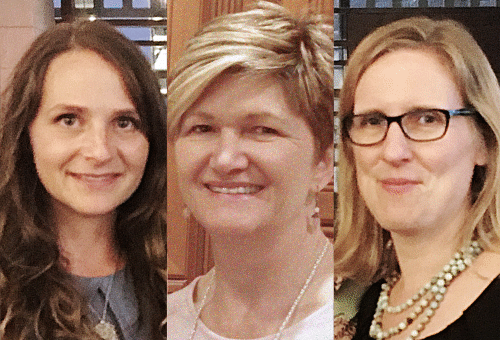Do people who willingly hold down multiple careers at the same time struggle like the rest of us to find authenticity in their work? Brianna Caza, Sherry Moss & Heather Vough (of the University of Manitoba, Wake Forest University, and the University of Cincinnati) talk with us about what their research found. Their open-access article, “From Synchronizing to Harmonizing: The Process of Authenticating Multiple Work Identities” was published on September 26, 2017 in Administrative Science Quarterly.
Websites
- Harvard Business Review article by Brianna, Heather, and Sherry (Oct. 2017)
- Follow-up article in Harvard Business Review by Brianna and other coauthors
Press coverage
Quartz | Organizational Musings
Bonus Clips
Due to technical problems with the audio, clips from the interview with Brianna Caza and Heather Vough were not included in the episode. Those clips are available below.
▲ Heather Vough & Brianna Caza on what is the gig economy
▲ Heather Vough on what is identity and authenticity in the work context
▲ Heather Vough on using multifaceted perspectives on identity to research authenticity
▲ Heather Vough & Brianna Caza on what is grounded theory qualitative method and how is it done
▲ Brianna Caza on the value and challenges of qualitative grounded theory research
▲ Heather Vough on analyzing the data to create the story of the article
▲ Heather Vough on quality checking the data
▲ Heather Vough on identity and career pluralism in academic careers
▲ Brianna Caza on the personal impacts of doing this research
▲ Heather Vough on the emergence of career pluralism
▲ Heather Vough on imposter syndrome
▲ Heather Vough on her role in the research project
▲ Sherry Moss on parallels with multiracial research literature
Patrons of Parsing Science gain exclusive access to bonus clips from all our episodes and can also download mp3s of every individual episode.
Support us for as little as $1 per month at Patreon. Cancel anytime.
Hosts / Producers
Ryan Watkins & Doug Leigh
How to Cite
Watkins, R., Leigh, D., Caza, B., Moss, S. & Vough, H. (2018, June 12). Parsing Science – Multiple Work Identities. figshare. https://doi.org/10.6084/m9.figshare.6510287
Music
What’s The Angle? by Shane Ivers




Lastly, Ryan and I were curious if anyone on the research team considered themselves to be career pluralists. Sherry offers her perspective on the question.@rwatkins says:
It would seem that if there’s anyone who we hope, and maybe expect, to understand us, it’s our romantic partner. So Doug and I asked Sherry to talk with us about the extent to which the study's participants felt understood and supported by their romantic partners.@rwatkins says:
Another finding from the study was that after they found authenticity within their individual jobs, plural careerists were able to develop a sense of coherence and continuity among them, as Sherry describes next.@rwatkins says:
Plural careerists can struggle with being recognized and understood by others, which can affect their sense of authenticity. As Sherry describes next, this led some of the study's participants to distance themselves from people who questioned their commitment and legitimacy.@rwatkins says:
While researchers may breath a sigh of relief when their study is finally ready for submission for publication in a journal ... it can also be bittersweet for some. While on one hand, it represents the opportunity for a researcher to share their work with the larger public ... on the other, it can serve as a reminder that a project that’s been near and dear for months … or even years .... has come to a close, as Sherry discussed with us next.@rwatkins says:
Doug and I were curious to hear how Brianna, Sherry and Heather - who are located hundreds of miles from each other - went about collaborating on the writing of their manuscript. Sherry talked with us about how the team coordinated with one another throughout that process.@rwatkins says:
In qualitative studies, a researcher is both the data collection instrument, as well as the interpreter of the data they obtain ... which can introduce undesired bias into a study. One way of addressing this is through "member checking” in which the researcher runs their findings by participants to determine the accuracy of their conclusions … a technique which Sherry discussed with us next.@rwatkins says:
Doug and I wondered whether career pluralists are born or made. So we asked whether the people in the study started out pursuing multiple jobs … or if the idea to to so came to them over time.@rwatkins says:
Forty eight people with multiple careers participated in Brianna, Sherry and Heather's study. [Ryan and I] were interested in learning what kind of characteristics are shared among people who choose to take on additional jobs beyond those that pay their bills.@rwatkins says:
“Career pluralists” don't necessarily hold down multiple jobs at the same time in order to make a living, but do so because they find the diversity of work rewarding to their larger sense of identity. Doug and I wanted to know more about what makes people like this ... tick.@rwatkins says:
From this idea, Brianna, Sherry and Heather decided to carry out a qualitative study of the meaning people find in their work ... but as they began to recruit people for their interviews, they happened upon "plural careerists" ... people who identify with multiple jobs as being an important part of their lives at the same time ... as Sherry describes next.@rwatkins says:
Sometimes where the idea for a research project begins and where it ends up aren't necessarily one in the same, as was the case with this study. Doug and I began our conversation by talking with Sherry about how the idea for their project came about and where they took it from there.